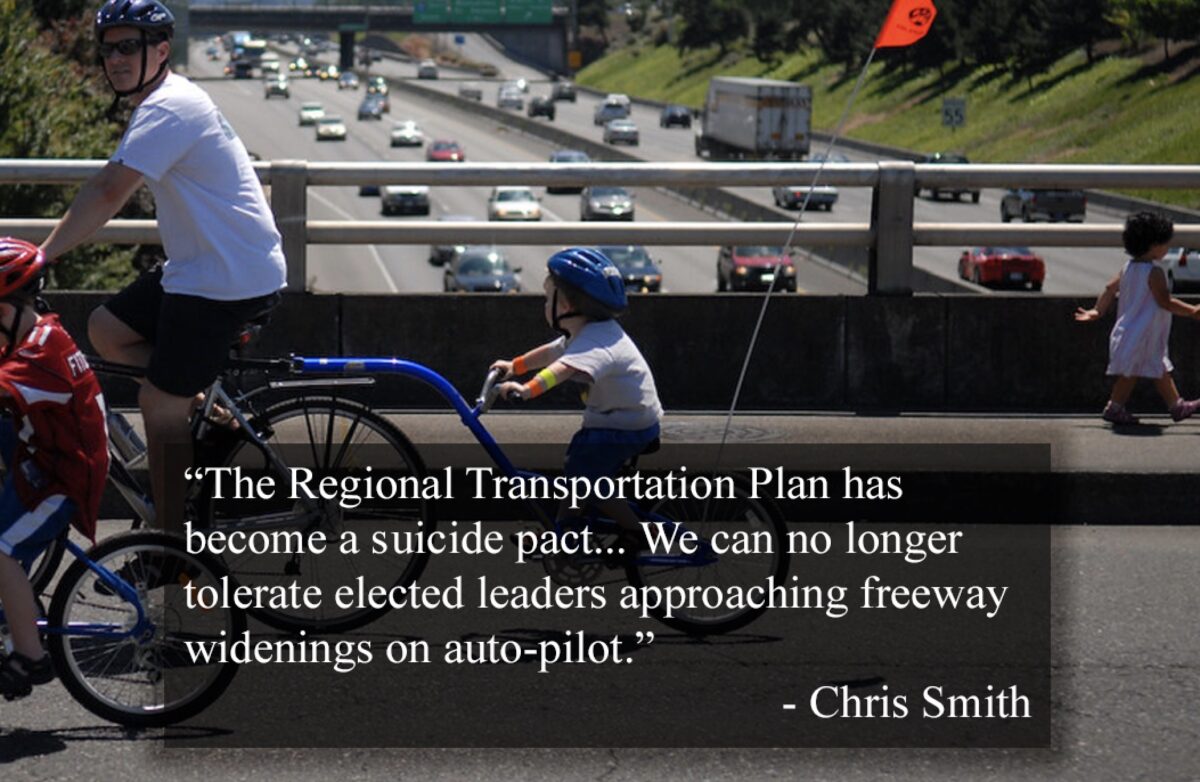
This opinion is from Chris Smith, a co-founder of No More Freeways and a member of the Portland Planning Commission. He previously wrote for us about bicycling the ‘last mile’ and his race for Metro Council.

Four years ago, I convened the group that became No More Freeways PDX to oppose the Rose Quarter Freeway Expansion in Portland because it was not good for our city or our planet (we’re having our birthday party at the end of August!). We continue to fight that project on a number of fronts, but ODOT is planning urban freeway expansions in other parts of our region:
- Widening of Highway 217 (project page)
- Adding a third lane in both directions to I-205 from Stafford Road to the Abernethy Bridge in Clackamas County and widening the bridge (in Oregon City) to three lanes in each direction (project page)
- The Columbia River Crossing 2.0 (which ODOT and WSDOT have rebranded as the Interstate Bridge Replacement Project), reviving a 12-lane design from a decade ago
- Widening I-5 near Wilsonville, which ODOT is framing as a replacement of the Boone Bridge (project page)
Last week I watched with disgust (if not surprise) as the Joint Policy Advisory Committee on Transportation; the committee of local elected leaders which, in conjunction with Metro Council, governs transportation funding in the region, advanced funding plans for two of these projects on their ‘consent agenda’, i.e., without a debate or vote on the specific plans. Metro’s vote came in spite of compelling testimony from the youth climate activists at Sunrise PDX.
It seems that any time we ask for more funding for transit, biking or walking our government agencies cry poverty, but when billions of dollars of freeway widening are on the line, our state and local governments don’t raise any objection.
In 2021, we simply can no longer tolerate elected leaders approaching freeway widenings on auto-pilot, especially any local leader who ostensibly claims to care about the climate emergency that just killed over 100 Oregonians.
[Related: From 2017, It can happen here: The normalization of freeway expansions]
These funding plans for Highway 217 and the Abernethy Bridge are on the agenda for the July 29th Metro Council meeting. It’s vitally important that we tell the Metro Council that these projects are not ‘just normal’ any more. Here’s why:
Advertisement
Think Globally, Act Locally
There is strong consensus among climate scientists that Oregon’s drought, wildfires and last month’s “heat dome” are directly related to global climate disruption. We are feeling the impacts of greenhouse gases released globally, but 40% of our local contribution to GHG emissions comes from transportation and it’s rising, even as emissions from other sources are trending down (although not as quickly as we need).
The Regional Transportation Plan Has Become a Suicide Pact
A number of these projects have been in the Regional Transportation Plan (the region’s federally-mandated list of high-priority projects) for years, if not decades. During that time, our understanding of the climate emergency has only become clearer and more urgent. Other policies in the RTP to reduce traffic demand have simply not worked. It’s time to recognize that the RTP does not work for our community!
It’s Not About Congestion

Elected officials like to hide behind congestion: “If we get traffic flowing freely,” they say, “emissions at the bottleneck will go down.” But overall analysis of the system tells us that there is a direct relationship between roads and emissions. I won’t go into the details of induced demand here, but the data is clear: if you add 1% more lane-miles, you get 1% more traffic (and emissions).
As detailed in Transportation For America’s Congestion Con report, Between 1993 and 2017, the 100 largest urbanized areas in the United States spent more than $500 billion adding new freeways or expanding existing ones. In those same cities, congestion increased by 144 percent, significantly outpacing population growth. Given their regional portfolio and governing priorities, Metro is well-situated to be the government agency to call ODOT’s bluff on their nonsensical claims about congestion relief. Our region absolutely needs to address traffic congestion – it’s time Metro pointed out that ODOT clearly doesn’t intend to solve it.
Electrification Will Not Save Us
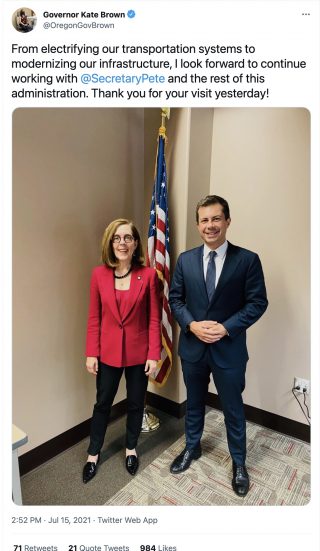
Elected officials like to hide behind electric vehicles (see image at right).
While electrification of our fleet will reduce GHG emissions, it’s not sufficient by itself. The best numbers available tell us that even with aggressive electrification, we need to reduce driving by 20% or more to balance our carbon books to avoid the worst impacts of climate change. And to be clear – we’re not seeing anywhere near an aggressive uptake of vehicle electrification at this point.
So far in 2021, fewer than 250,000 EVs have been sold in the US. Meanwhile, light trucks like the Ford F-150 continue to dominate: over 1 million were sold in just the last month. These cars will be on our roads for as much as two decades. It’s simply imperative we build communities where Oregonians have alternatives to driving for every trip, and dumping billions into freeways robs us of the resources we need for this shift.
Price Before You Build
“Good policy would impose pricing first, then assess whether the resulting demand warrants new capacity in the system.”
We are slowly moving to a consensus in Oregon that we have to price use of our road system. But we have not yet converged on a strategy to do that well. Good policy would impose pricing first, then assess whether the resulting demand warrants new capacity in the system. Incredibly, for both the Rose Quarter and Abernethy Bridge, ODOT will first build the roads, then toll them later to pay off bonds. Decades of research show that congestion pricing is the only tool proven to tackle not only recurring traffic jams but also reduce both air pollution, carbon emissions. Both the City of Portland and Metro have undertaken significant work to think about the equitable implementation of pricing roads – ODOT’s freeway expansions and subsequent tolling for revenue (not for congestion relief) preempt local and regional efforts to implement this policy more in line with equity, climate, public health or congestion relief goals.
How You Price, Matters
By tolling the Abernethy Bridge, ODOT is basically putting themselves in the situation where they need sustained levels of traffic to pay off the project bonds. Reductions in driving to help GHG emissions would break their financial model. We’re baking ongoing GHG emissions into the project!
In contrast, congestion pricing to manage demand over the bridge would include the option to spend the revenue generated on offsetting programs (like transit or active transportation) to reduce demand and increase equity. The last thing Oregon needs, as the state suffers from over 400,000 acres of wildfires currently burning before the beginning of August, is to create perverse financial incentives for the state to need to perpetuate carbon-intensive driving to pay off bonds.
Tell Metro to Vote No on July 29th
For all these reasons we need to tell Metro Council to not vote for ‘business as usual’ for these projects. Ask Metro to deny approval of Resolution No. 21-5188 (Highway 217) and Resolution No. 21-5192 (I-205 Abernethy Bridge). Our elected officials don’t fully realize how many of us are feeling the climate anxiety from the last few months, and how strongly we understand the link between these terrible freeway expansions and our rising oceans and burning forests. They need to hear from us. Please contact your Metro Councilor before their vote.
You can also submit testimony to the July 29th meeting in advance, or you can join the meeting via Zoom at 2:00 pm where you can raise your hand to testify (agenda pending). Drop us an email at No More Freeways if you have more questions or want some help thinking through your oral or written testimony.
— Chris Smith, @chrissmithus on Twitter.
— Get our headlines delivered to your inbox.
— Support this independent community media outlet with a one-time contribution or monthly subscription.



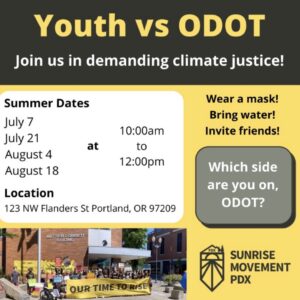
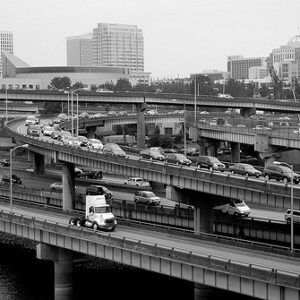
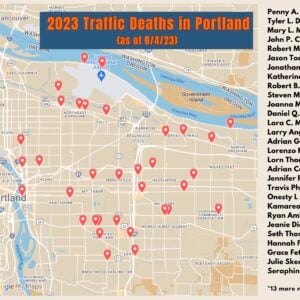
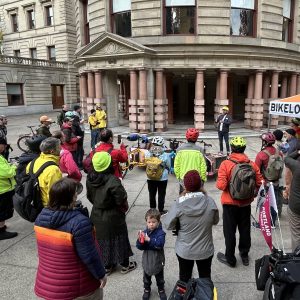
Thanks for reading.
BikePortland has served this community with independent community journalism since 2005. We rely on subscriptions from readers like you to survive. Your financial support is vital in keeping this valuable resource alive and well.
Please subscribe today to strengthen and expand our work.
UPDATE: Metro has moved the MTIP amendments to a special meeting at 2pm on Aug 3.
Thanks Chris & the NMF crew.
To put the necessary emission reductions into perspective:
To prevent more than 1.5C of warming, “emissions from transport need to plummet every year at just under the rate at which they plummeted under COVID” – Ketan Joshi.
In other words, rather than returning to pre-pandemic emissions levels, we actually need nearly another pandemic-level reduction in carbon pollution from transport, *with reductions on top of reductions every year*.
Basically just imagine a cliff: transport pollution has to fall off it (while ODOT has in practice done everything possible to actually increase emissions).
I really don’t think elected leaders understand how monumental this task is (or if they do, they seem to be doing a great job ignoring it, and every day of delay makes the cliff we need to climb down even steeper).
House Speaker Kotek, Tear Gas Ted, and Governor Brown are more than happy to talk about the threat of climate change one day and push for new carbon intensive infrastructure the next.
It’s just part of getting elected here. You pay lip service to progressive causes and then do whatever you want because the populace of this state cares but is uninterested in accountability.
“the populace of this state cares”
Many care about the climate crisis as an abstraction but don’t believe that it will effect them personally.
This probably explains why even the most anemic carbon taxes have failed miserably at the polls:
https://news.climate.columbia.edu/2021/04/26/retire-carbon-tax/
I suspect we won’t see any real change in this “head in sand” dynamic until more people start to viscerally fear the consequences of the climate crisis. It’s my guess that this will start to happen in the 30s when the doom cycle punches through human evolutionary tolerance for gradual increases in harm/risk.
Since when has common sense been the driving force in American decision making? I see where Oakland has just approved spending $12 billion for a new baseball stadium despite rampant poverty, crime, and homelessness in the city. And the Oakland A’s baseball team wants even more! The old “jobs” ploy never seems to fail when it come to approving overpriced boondoggles.
I know the planning part of this conversation usually takes a backseat in these freeway expansion debates, but it is the FIRST THING we should be thinking about and why we keep letting it happen. Metro is allowing the demand to grow by creating auto-dependent communities everyday at the fringe of our region. The sad truth is: this is happening in almost every U.S. city as we speak.
The point of Metro was to plan and build a sustainable, efficient region by prioritizing density and reduce urban sprawl. But then every year the urban growth boundary is expanded at the most inefficient places to place more single family housing.
If anything, the only thing Metro has found itself being efficient at is slowly shooting themselves in the foot at the behest of cities so they can have more properties on their tax roll.
We should be telling Metro to stop expanding the UGB and focus on providing infill development, and mixed-use transit-oriented development every day. Coordinating smart growth is Metro’s mantra, and fundamental to its founding. There is nothing smart about it if at the end of the day they are needing to gather billions for regional freeway expansions.
You do that and the little houses in Cully go up in price to a million each.
I am always amazed that since the stated goal is to reduce congestion, there is no mention of the following items from public officials. Added Rail lines to take freight off the roadway, re-opening the port to move freight back onto the river, and improved public transport to reduce the number of private vehicles. None of these require bigger roads.
Can someone explain what “equitable tolling” means? Not as an academic concept, but how it would be implemented, on the ground, for drivers.
It doesn’t exist, because the methods needed to make it truly equitable are not really viable. How do you verify income of every driver coming through?
The only viable option seems like some sort of “low-income discount pass” program, which will obviously be abused. It would be easy to lie about income, have low-income relatives request passes that people then “borrow”, and other shenanigans. An already unpopular tolling system like this is going to go down in flames with the added complications of “equity”.
We need demand-based tolling, and let’s leave everything else out of it. If we are concerned about equity, there are better ways to address it (income tax policy, UBI, etc).
Some notes from Transform’s analysis from a couple of years ago:
Equitable tolling involves both the process (participation and decision-making) and the outcomes (affordability, access to opportunity, and health). In terms of outcomes — Affordability might look like discounts or exemptions for low income drivers. Access to opportunity includes things like using resources raised from tolls to increase transit service, especially for people with low incomes and other marginalized groups. Community health includes things that improve air quality, like electric buses and ensuring the project overall reduces driving.
A couple of principles for equitable tolling: (1) vary the charges by income, there are folks who believe this is achievable, although it would be cutting edge. (2) what you spend the money on – if you spend it on giving people more transportation choices, and reduce auto-dependency, you can definitely improve the equity of the system
I always share this primer on ways to think about equitable congestion pricing.
https://medium.com/100-hours/is-congestion-pricing-fair-to-the-poor-62e281924ca3
Metropolitan Planning Organizations (MPO) are universally rubber stamps in pretty much every jurisdiction nationwide, largely “governed” by very nice old people who really don’t care about the long-term consequences of their actions (or rather their inactions). They were set up in the 1970s to do quite the opposite, but through inertia and strong lobbying by highway constructors and engineers, they have become what they are.
When the revolution comes, they’ll have died of old age watching it on television.
If you want real change, don’t let any state or federal representative/senator over the age of 35 get elected.
I’d like to add 2 more change rules:
1. Don’t elect state or federal representatives/senators who make more than 50K each year.
2. Don’t elect male/masc state or federal representatives/senators.
I’m curious why comment didn’t pass the test here. Is it not okay to disagree with soren?
The “heat dome” phenomenon is the result of weaker winds in the upper atmosphere (ie, the jet stream).
The jet stream is weaker because the pole is warming. Soon, all the Arctic sea ice will be gone permanently. There will be no jet stream. And the climate as we know it will be gone. And then the food we all depend on will be gone.
This is the “tipping point” the scientists are talking about. Search “Arctic blue ocean event” if you want to know more.
The Arctic will be permanently blue by 2030 at the latest, likely earlier. No matter how many emissions we prevent or how many freeways we don’t widen.
Sorry Chris, but the suicide pact has already been signed, sealed, and delivered. Enjoy your life while you still can.
Scientists report discovering dozens of never seen before viruses locked up in ice. They don’t know what they do. We’re about to find out.
respectfully, please take your climate doomerism elsewhere. don’t have time for this nihilist crap
Respectfully, please take your science denial crap elsewhere. Or debate on the merits.
One of the other things that I find to be really problematic about local climate activism is that it is often “fact-challenged”.
Scenario 2 in Chris’ link clearly indicates that electrification alone could effectively decarbonize transportation in OR:
And, yes, I think it is unfortunately possible that in this new era of multi-trillion dollar stimulus spending we could “cash for clunkers” our way to 100% EVs by 2050.
I vastly prefer scenarios where much of this decarbonization occurs via mode share shifts and greater VMT reductions (for many reasons) but when activists distort reality like this Kate Brown and other corp-licking Democrats are empowered to dismiss “loony” climate activism.
Performative reductions in local emissions in USAnian metro areas typically come at the expense of continued higher increases in exported emissions. Based on this kind of rhetoric I have no confidence that “No More Freeways” understands that this is a systemic political struggle and that localism (a form of nationalism) has functioned as an excuse to not engage in the radical politics that are essential to beginning to address ecocide. Advocating for reductions in sector-based emissions in a city like Portland while ignoring the fact that consumption-based emissions continue to increase is a form of climate science denial.
(Note: Both OR and the Portland Metro area have stopped publishing consumption-based inventories because they almost certainly look very, very bad — based on extrapolation from C40 data from similar cities.)
I should note that I’m not a fan of “Climate Solutions” (the org that prepared the report that Chris linked to) because they have a pro-capitalism stance that, IMO, limits the “Overton Window” of mitigation scenarios they are willing to consider.
Honestly none of the three main scenarios in the report from “Climate Solutions” seem entirely plausible, since they all assume that 15-21% of the state’s electricity will come from burning methane and somehow capturing its emissions.
(Perhaps I missed the citation explaining how that’s a valid assumption, but without it all I can say is that IMHO ‘carbon capture and storage’ is the commercially unproven pipe dream of fossil fuel companies trying to stay relevant.)
Those numbers are very much in line with IPCC modeling of mitigations pathways. I personally support mitigation that relies more on conventional storage but modeling suggests that this would require a large drop in consumption in wealthier nations.
Unfortunately this is no longer the case. CCS and the hydrogen economy are growing at a rapid pace and costs will likely plummet over time. One of the major flaws of lefty climate activism is a belief that ongoing “ecocide” imposes some sort of Malthusian limit on technological innovation in the context of dehumanizing extractive capitalism. It’s almost as if they expect innovation for renewables and battery storage but refuse to believe that this could also occur for the CCS, BECCs, and hydrogen that the extractive energy industry sees as a big part of its future.
“Amid the COVID-19 crisis, the global market for Carbon Capture and Storage estimated at US$2.7 Billion in the year 2020, is projected to reach a revised size of US$4.5 Billion by 2027, growing at a CAGR of 7.7% over the analysis period 2020-2027.Pre-Combustion, one of the segments analyzed in the report, is projected to grow at a 7.9% CAGR to reach US$3.3 Billion by the end of the analysis period.After an early analysis of the business implications of the pandemic and its induced economic crisis, growth in the Post Combustion segment is readjusted to a revised 8.4% CAGR for the next 7-year period. This segment currently accounts for a 11.3% share of the global Carbon Capture and Storage market.”
https://www.reportlinker.com/p05205339/Global-Carbon-Capture-and-Storage-Industry.html?utm_source=GNW
Do you have a non-paywalled source? The intro doesn’t exactly sell it for me:
“…estimated at US$2.7 Billion… projected to reach… projected to grow … an early analysis…”
Since physics doesn’t care about markets and future projections, I’d be more interested in what’s actually happening in terms of emission reductions.
Exxon is a great example of a company that certainly has the resources to make use of CCS but their outcomes in that area are… uninspiring.
First of all, I want to make clear that I’m viciously opposed to CCS in the context of fossil fuel production so don’t take my comments above as in any way endorsing this “kick the can down the ecocidal road” technology. My point is that just like the “bikes will save us” and “EVs suck” rhetoric on bike portland, lefty climate activism has a massive blind spot when it comes to the ability of brutal, dehumanizing, and ecocidal capitalism to reinvent/rebrand itself.
https://www.c2es.org/content/carbon-capture/
https://cen.acs.org/energy/fossil-fuels/Carbon-capture-projects-proliferate/99/i27
https://www.bloomberg.com/news/articles/2021-07-21/eu-climate-plan-drives-carbon-capture-interest
And, lean on the powers thet be in Clark County to change their thinking, too. There was an AWFUL edtorial in this morning’s Columbian that advocates for a wider Interstate bridge in the name of the climate. Somebody there has not yet heard of induced demand and they still believe the insane crap about cars sitting in slow traffic polluting more. Next thing they’ll be complaining about cyclists breathing too hard.
It’s generous of you to assume they aren’t purposefully lying. Judging how quickly all of the DOTS latched onto the lie that bigger, faster roads are good for the environment without any actual evidence, I don’t quite believe these educated folks don’t know they are doing something wrong.
It’s like supply-side economics, you put a theory out there with nothing behind it but kinda sorta sounds like it might make sense to the lay person, then you repeat it over and over again and just ignore the countless people who prove your theory wrong.
It is obscene that our elected leaders are still in denial about climate change. How many climate change enhanced natural disasters will it take for corporate politicians like Kate Brown to act with urgency? Freeway expansion shouldn’t even be on the table. Pandering isn’t action – taking steps to drastically decrease emissions is action.
I love Chris Smith. Can we recall Ted and get Chris please?
Downtown and most of the inner city has become a black lives matter and antifa hell hole. Bums and trash everywhere and no help in sight. Citizens get robbed and assaulted and the cops will blame you being in the inner city instead of the suburbs. Major freeways are needed so we can avoid the crap hole of inner Portland and go through it or around it.